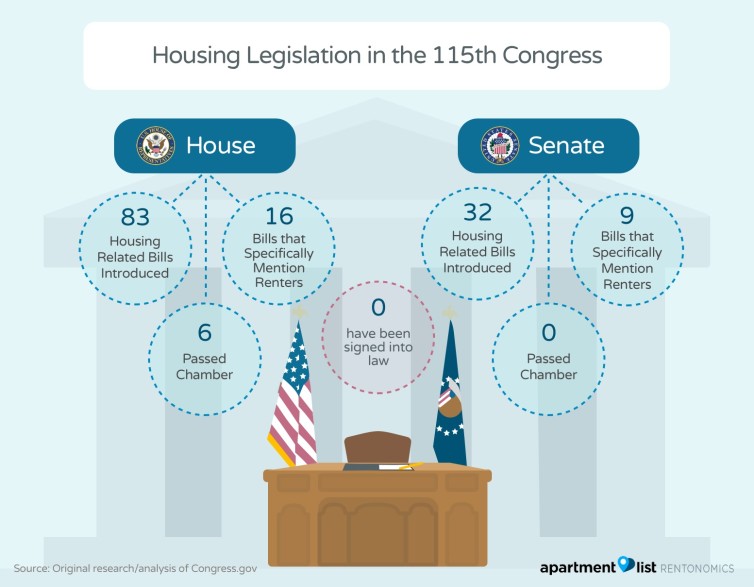
As housing is becoming more and more expensive, more Americans are struggling to pay their housing bills. In the face of a looming housing crisis, housing-related policies are still failing to reach the Oval Office.
A new study published by Apartment List revealed that out of the 10,222 bills that have been introduced to the 115th Congress, only 115 of the bills were related to housing, and none of them made it to the President’s desk. Lack of urgency on the federal level is worrisome, as home prices are predicted to rise twice as fast as the speed of inflation and wages. 14% of all American households identify as severely cost-burdened, meaning they spend 50% or more of their household income. Almost 50% of all renters in the United States are spending more than 30 percent of their incomes on housing. This serves as a significant barrier for those trying to build wealth and enter the middle class. As elected officials continually and aggressively court middle-class voters, this is an issue that should capture their attention. Regardless as to whether or not an individual aspires to rent or own a home, the issue of housing is not at the forefront of federal lawmaker’s minds.
The few housing bills that are introduced by lawmakers are mostly geared towards helping those that own, exacerbating the issue of viability for those in the rental market. This trend can be seen in the 115th Congress in out of the 83 bills that the House and 32 in the Senate, only 25 specifically mentioned supporting renters (16 in the House and 9 in the Senate).
After analyzing Congressional websites, researchers discovered that only 14% of lawmakers have a dedicated housing issues page, and 42% have little to nothing easily accessible to the public. 70% of Congressmen and Congresswomen who are taking the most tangible action on housing policy are members of the Congressional Black Caucus, Congressional Hispanic Caucus, or the Congressional Asian Pacific American Caucus.

The study looked at both sponsored and co-sponsored bills and found that the top 5 most active members of House of Representatives on housing policy were Maxine Waters (D), Yvette Clarke (D), Eleanor Holmes Norton (D), Al Green (D) and Steve Stivers (R). The House Representatives, states that have a higher than average concentration of renters and severely cost-burdened renters are more likely to be leading the way on housing policy. The top 5 more active members of Senate were Marco Rubio (R), Tim Scott (R), Tim Kaine (D), Richard Blumenthal (D), Jeanne Shaheen (D).
A recent analysis of 2018 candidates has shown that Democrats have nominated 133 people of color and 158 first-time candidates to run for the House of Representatives. If current trends continue this could mean housing policy could see more action in the next Congress starting in 2019. Regardless of the outcome of the 2018 midterm elections, come January, the 116th Congress will have its work cut out for them and their positions and priorities for housing policies can and will likely have major implication for all Americans for years to come.